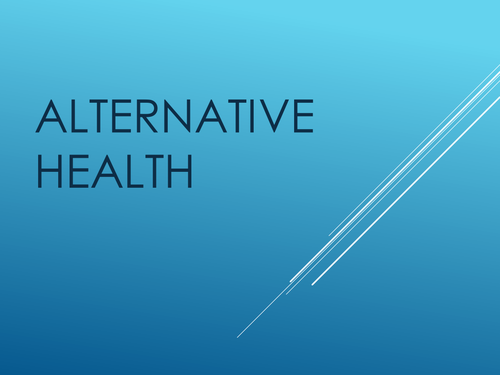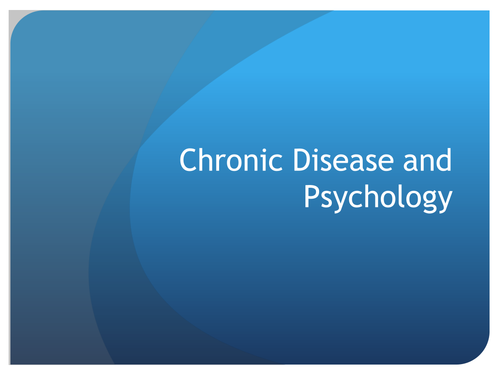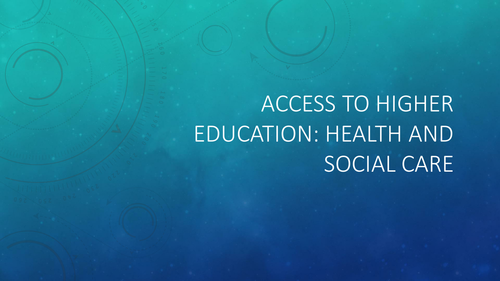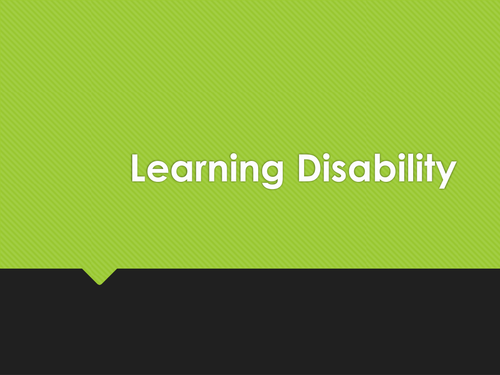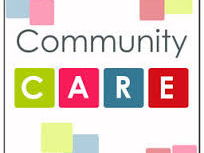
134Uploads
50k+Views
12k+Downloads
Biology

Alternative Health Care
A teacher-led presentation on Alternative Health and Complementary Lesson which could be delivered prior to students embarking on independent activities (these would have to be created).
Originally aimed at Access to HE but could be tailored to suit a range of courses.
Students should be able to describe and evaluate various aspects of Alternative Health Care by the end of the session.

Chronic Disease and Psychology
A Full lesson with student activities surrounding psychology and how its theories can be used to explain/support Chronic Disease.
The lesson covers Pain Management/Gate Control Theory, Coping Strategies, Pain Perception, Wound Healing, Behaviour Change Models and Biofeedback.
It was originally written for Access to HE Health and Social Sciences (Level 3) students but can be tailored to fit other courses.

Impact of Multi-Disciplinary Approach and Professional Bodies
PowerPoint with some teacher prompts based on recent research and full of student activities. Students can be fairly self-sufficient during this session. This was originally written for Access to HE but will also be useful for A-Level.
Objectives are as follows:
To Recap prior learning
To Explain what is meant by the term ‘multi-disciplinary team’ (MDT)
To Evaluate multi-disciplinary team working within the Health and Social Care context
To Analyse the influence of a health care professional and their professional bodies

Alcohol and Drug Awareness Tutorial
This Tutorial features an activity on the 'Say No To Drugs campaign', an embedded maths activity on what alcohol data is showing amongst other discussion and research style activities.
By the end of the session, students will be more knowledgeable on the dangers of alcohol and drugs.

Cell Division Part 3
This is the final part of a series of 3 lessons on Cell Division and Heredity. Students will explore Monohybrid and Dihybrid crosses, Explain the cause of variation and research an influential figure in genetics.

Medicalisation
Whole lesson with activities covering medicalisation in terms of the 'Third Sex', 'Homosexuality' and 'Dying'.
Covers points such as cross-cultural perspectives and social control.
Originally produced for Access to Higher Education but could be adapted to meet some Sociology specifications for other courses.

Introduction to Learning Disabilities and Advocacy
This PowerPoint was designed for a full day lesson, aimed at Level 3 students.
It covers types of advocacy, active participation, definitions and causes, medical and social models of disabilities.
Lots of discovery learning, group work and activities which students can relate to real life contexts.

Smoking
Originally produced for BTEC H&SC, Unit 9, Level 2 but would also be suitable for GCSE.
Lesson was delivered in 1.5 hours with objectives as follows:
To describe how smoking can effect health
To explain why a smoker is at risk of diseases
Please note, the quiz I have adapted from elsewhere but all other activities are original.
Student activities include a smoking advert analysis, a paired extension activity where students investigate Cannabis, labelling physical and emotional health effects on worksheet provided, producing a warning poster/warning leaflet, starter activity and a range of other activities.

Cell Division
This is a lesson which is student led as students will be researching the processes of meiosis and mitosis, as well as becoming familiar with key terminology associated with this area. This was originally produced for A-Level but will also be appropriate for Access to HE and Foundation Degree's. It can be used to compliment handouts which you may already have produced for students on this topic area.

Mental Health Inequalities and Discrimination
Two full days worth of lessons which could be delivered across several weeks to suit a range of timetables. Originally designed for Level 3 students, this is a detailed presentations containing thought provoking activities for students. It could be tailored to fit several subject areas and student abilities.
No teacher preparation needed but students would benefit from A3 poster for one of the activities.
Content is as follows: considering the impact that an unequal society may have on mental health statuses via a group research task. This will include topics such as geographical factors, unemployment and socio-economic status.
Impact of mental health discrimination and the laws/policies surrounding this-student poster activity.
The second section of the powerpoint looks at social norms, the link between misconceptions of individuals with mental health conditions being criminals-leading to looking at the deviancy amplification theory.
Scenarios and thought-provoking questions throughout which can be tailored dependent on student ability.

What is classified as Normal and Abnormal behaviour?
This worksheet is best bought as part of a bundle with the accompanying PowerPoint. Students will indicate a list of behaviours and whether they deem them as normal or abnormal. They will then justify their responses. Can be used a starter or a plenary.

Ethics and Reflective Practice
Originally designed for Access to HE Health and Social Care but could easily be tailored to suit a range of other courses.
This is three lessons (3 hours in length each depending on pace and ability of the group) worth of activities and notes for teacher-led mini tutorials. Lessons plans included which can be tweaked and copied over to your organisations paper work.
The following objectives should be met via a range of research, debate, discussion and independent student activities which have been included:
Identify a main theme with regard to ethical issues (e.g. confidentiality, consent, self-determination) and discuss the underpinning theory
Identify and analyze how a relevant professional code of practice relates to and affects decision-making with regard to your chosen theme
Identify and analyze how the law relates to your theme
Explain, and use, a model of reflective practice in relation to your personal and professional development
To identify and utilise a reflective model of practice.
To identify examples of assignment headings and assignment ideas/Exams
Implement private study plans with regards to Community Health Assignment/Exams
E&D, Employability, ICT, Study Skills and English inherent throughout.

Know Discriminatory Practices in Health and Social Care
Written for new BTEC Specification, Level 3, Unit 2, Equality and Diversity in Health and Social Care.
Full 2.5 hour lesson which is mapped to part of the assignment with student activities throughout which include scenarios, group research tasks, case studies.
Minimal teacher input required.

Living Healthily Tutorial
This was produced for a short tutorial based on living healthily. Students partake in small group discussions, complete creative activities and learn that health is subdivided into different areas.
The plenary focusing on online peer pressure and asks students to give advice to a friend. Very topical considering that the number of cases of online peer pressure/cyber-bullying are on the rise.
This session is suitable for teenagers to adults. You will need minimum of an hour to do this tutorial and perhaps some poster/leaflet making materials e.g. pens and paper if possible. Students could also word process their work if computers are available.
Lesson Objectives:

Cell Division Part 2
This is the second part of a series of three lessons on cell division. Learners are encouraged to be independent and this lesson incorporates discovery learning methods on genetic disorders, Punnett Grids and contextualises meiosis with a research activity on Spermatogenesis and Oogenesis.

Digestive System
This presentation provides an overview of the digestive system and can be used as a tutor-led introduction to a session or as a revision material to be given to students.

Community Care-Health and Social Care Provision
This lesson is aimed at developing students academic skills and giving them an overview into the various aspects of Community Care and why it is necessary considering the current state of the Health and Social Care system. This was originally delivered in two, 3 hour blocks, however can easily be adapted to work over several shorter lessons.
The lesson covers:
Overview of Community Care
Examples of Services
Primary and Intermediate Care
Real life examples with case studies
Day Centres
Home Care VS Hospital Care
Reducing Avoidable admissions
Self Management of Health Conditions
Tele-Health/Tele-Care
The activities which have been included for students are designed to prepare students for university e.g. writing literature reviews, investigative the effectiveness, evaluations, research and discussions.
References and Data used throughout.
Bundle

Cell Division
A series of 3 lessons which are discovery learning/research based in nature as these lessons were originally taught to Level 3 learners (A-Level, Access to HE) who were applying for university.
Students wil explore the meiosis and mitosis, genetic variation, genetic disorders and how they are caused as well as explaining monohybrid and dihybrid crosses and famous geneticist.
This bundle will compliment any handouts you may have which will supplements students learning.
Bundle

Study Skills/Employability
This bundle is aimed at ages 16-Adults and covers essential aspects of most study skills/employment courses.
It can also be used for tutorials during the lead up to students applying for jobs or applying for university.
This bundle also includes presentation skills, career planning and personal SWOT Analyses.
Bundle

Tutorial
This bundle features key tutorial topics surrounding bullying, drugs, employability, UCAS, alcohol, keeping healthy, radicalisation and more. It is aimed at 14-Adults.
There are numerous activities which include citizenship, values, english, maths, ICT and employability.

